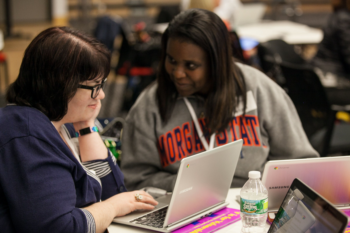Student Grading Considerations with COVID-19 School Modifications
COVID-19 pandemic surges continue to keep schools closed or programs modified. How will K-12 teachers support students, when they have limited time to work with them in class or through distance learning programs? What standardized testing programs have been altered or eliminated this year and how will it impact many college acceptances?
Winter Conference Tips
Here are some tips to discuss with teachers at your upcoming winter conferences:
- Clarify with the teacher or principal how teachers will grade students during the pandemic if the school is providing distance learning, hybrid learning, or modified on-site learning to ensure an accurate evaluation.
- Have your children organize and collect their class work to ensure it is documented and reviewed by a teacher if there is a disagreement about a specific class grade.
- Confirm with teachers or the school’s principal specific assignments that must be returned to school on specified dates if there are regular collections of work from home.
- Have your children confirm how they can submit online assignments by email or through an online portfolio. Each teacher and school may have different requirements that may include how:
- your child can resolve any grading discrepancies
- the school or teacher will accommodate for documented learning disabilities.
- the school will test for specific learning challenges
- your child can receive tutorial support
- Ask the teacher or the principal what standardized testing will occur during this school year and how you can help your children prepare for any testing.
- If your child must take online tests for entry into competitive high schools or colleges, ask how will the tests be administered.
- Learn if there are any accommodations for documented learning disabilities.
- Ask the school’s principal how your children can secure college counseling support services due to limited pandemic student services activities.
- Verify how your children can apply for financial aid packages.
- Confirm how your children can participate in competitive high school or college visits.
- Check how the school is providing leadership programs, study skill preparation, and standardized testing preparation during the pandemic.
- Contact each competitive high school or college your children are applying to for any modified requirements due to the pandemic.
- Ask about adjustments are being made for students who are not participating in state and national standardized testing.
- Determine how the schools are accommodating for documented special education needs.
- Identify how your children can document traditional school leadership activities on school entrance applications when schools’ leadership and sports programs have been suspended or limited.
- Help you children relax and support them with lots of encouragement during this very challenging time as there are so many unanswered questions as schools struggle to equitably work with all students.
May your winter conferences ensure your children’s academic successes!
Mary Ann with Yvette
Copyright (c) 2021 by GenParenting

Mary Ann Burke, Ed.D., Digital Education Expert, is a substitute distance learning teacher for Oak Grove School District in San Jose, California and the author of STUDENT-ENGAGED ASSESSMENT: Strategies to Empower All Learners (Rowman & Littlefield: 2020). Dr. Burke creates digital language arts and substitute teaching K – 12 activities for teachers and parents. She is the Cofounder of the Genparenting.com blog. Burke is the former Director II of Categorical & Special Projects for the Santa Clara County Office of Education that supports 31 school districts serving 272,321 students in Santa Clara County. She is also a previous Director – State & Federal Compliance for Oakland Unified School District, the former Director – Grantwriter for the Compton Unified School District, and was the initial VISTA Director for the Community Partnership Coalition in southern California. Much of her work focuses on creating innovative digital trainings and partnership programs for teachers and families to support students’ learning. These programs were featured as a best practice at a National Title I Conference, California’s Title I Conferences, AERA Conferences, an ASCD Conference, the NASSP Conference, and statewide educator conferences.


